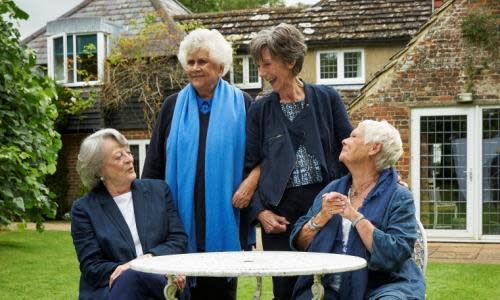Nothing Like a Dame review – Judi Dench and Maggie Smith trade brutal banter

The laughter and pure hysteria are infectious in this wildly enjoyable film. I can’t for the life of me think of any other recent documentary in which I have laughed pretty much all the way through. It is nothing more nor less than an acerbic round-table chat between four of British theatre’s most famed dames: Judi Dench, Joan Plowright, Eileen Atkins and Maggie Smith, which takes place at the country home Plowright shared with her late husband, Laurence Olivier (I seem to remember it being the site of Melvyn Bragg’s South Bank Show special on Olivier in the 80s).
This is basically an Avengers Infinity War of theatrical anecdotery: outrageously camp, with sensational stills and archive footage and very brisk assessment of the past – utterly unsentimental. Why is it when female stars of this calibre appear in a fiction feature together it’s always a horribly twee ordeal – when this shows they can be brutally funny?
Judi Dench has an extraordinary anecdote about being patronised by a 17-year-old paramedic last summer when she was “stung on the bum by a hornet”. She imitates this young man’s wheedling questions: “What’s our name?” “(Irritated) Judi.” “And have we got a carer?” “Fuck off! I’ve just done eight weeks in The Winter’s Tale at the Garrick.”
Dench also recounts her reply to Peter Hall’s request that she play Cleopatra: “Are you sure you want a menopausal dwarf?” Atkins interrupts: “That’s what she was.” “That’s how I played it.” The quartet agree that Antony and Cleopatra is very much Cleopatra’s play and the actor playing Antony is always very annoyed to discover this. Alan Bates was a key example, says one: “He actually wanted to play Cleopatra.” There’s an incredible clip of a 60s interview in which Smith says her delivery is stolen from Kenneth Williams – and the resemblance is unmistakable. Dench has another glorious memory of protesting with Vanessa Redgrave against the Vietnam war in Trafalgar Square in the 1960s: “Vanessa got arrested and remembered she had a matinee.” Atkins says she began her career in a sort of children’s gang show touring working men’s clubs called the “KY School” after the leaders’ initials – and couldn’t understand why people looked embarrassed.
Inevitably, there is a fair bit of discussion of the male monsters in their lives, particularly Larry. Smith says he would hit her on stage every night when she was Desdemona to his enraged and paranoid Othello: “It was the only time I saw stars at the National Theatre.” I would have loved to hear a discussion on a wider range of issues, particularly #TimesUp, but with a film this much fun, it seems churlish to ask for anything else.

 Yahoo Movies
Yahoo Movies 